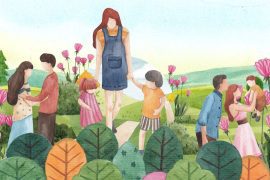By Jo Bealey
“You just want a healthy baby; that’s all that matters”, they told me.
I nodded, desperately trying to hold back the tears. It was a moment that had repeated itself for me after the scan of my third and last child-a beautiful, healthy boy.
While my husband celebrated, my heart ached. I had always envisioned having a little girl. Someone I could share my love for ballet, shopping sprees, and spa days. I envisioned her wearing cute little outfits, and as she grew, so would our closeness. We would share the same sense of humour and taste in Netflix series.
With each of my pregnancies, I experienced a new wave of grief. A sorrow for the daughter I would never have and the unique mother-daughter relationship that would forever elude me. It was a grief filled with guilt because, after all, I had the most beautiful, healthy boy in my tummy.
I carried this secret grief, a heavy burden I couldn’t share. My husband, while loving and supportive, couldn’t fully grasp the depth of my emotions. It was a very lonely type of grief, and having spent time with other expecting and new mums, I’m not alone.
So why is this grief shunned, and perhaps viewed as ungrateful?
In a world where infertility, pregnancy complications, and miscarriages are all too common, there can be societal pressure to be grateful for a healthy baby, regardless of gender. This can leave our grief with no place to go. This can impact our bond with the baby and make us question what our parenthood journey will look like if it wasn’t what we were expecting or hoping for.
When we fantasise about motherhood, often we have a gender in mind. This gender is usually preferred due to our own family experience and history. We may want to replicate the relationships we have or perhaps consciously repair and recover from painful relationships. Maybe experience the relationship we didn’t have the opportunity to have for ourselves.
Behind a gender, there is meaning: a fantasy. A hope for the future and a sense of connection and longing.
As I delved deeper into my longing for a daughter, I realised it went beyond the superficial. For me, I longed to recreate the special, secure relationship I share with my own mother. What we believe we can give and receive from that gender. To feel that extra bond with the baby, to feel they are an extension of yourself and what you can offer them as a parent.
My personal experience of finding out the sex of my baby prevented the initial baby bond in pregnancy with both eldest and youngest, and I purposely kept my middle pregnancy a surprise for this reason. But I hadn’t anticipated feeling even more guilty experiencing the disappointment while holding the most beautiful baby boy in my arms.
For a short while, I held resentment towards my husband as he started sharing all the things he could do with ‘his boys’. I was left feeling like an outsider. The lack of belonging weighed heavily with our gender fantasies.
As I continued on my journey of motherhood, I began to realise that the love between a parent and child is not confined to gender roles or societal expectations. It transcends all of that. My boys, despite not being the daughters I had initially hoped for, bring the most amount of joy and love into my life.











